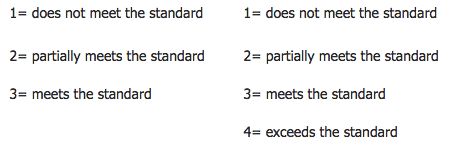Every now and then, I come across a letter from Uncle Curmudgeon, an old retired teacher, to his niece, Kennari, an aspiring new one. I’m happy to pass another along!
Dear Kennari-
So! You’ve signed up for your first committee! And you aren’t messing around with something like the staff breakfast planning team…you jumped in feet first. The report card revision committee! I like your style.
I’m excited to hear that your district is ditching traditional grades. It’s about blessed time! I never really understood what it meant to get a B. Did that mean a kid was pretty good? Did it mean they were smart but lazy? Confused but hard working? Compliant but not exceptionally so? And what did you call these newfangled grades—competency-based? If I understand what that means from the explanation in your letter, they sound promising. Marks might actually reflect academic competency instead of hoop-jumping! Sounds like there may be less guess work for teachers too—instead of everyone making up their own crazy system for grades, teachers can finally get on the same page.
You said that the big question your team is wrestling with is whether to go with a 3-point or 4-point scale.

For Pete’s sake—go with the 3! It seems to me that a 4-point system will be problematic on several fronts.
Exceeds the Standard?
Many standards simply can’t be exceeded. If the standard is 2-digit multiplication, how do you exceed that except by moving on to 3-digit multiplication (a different standard)? What about “knows all 26 letters of the alphabet”? Do you exceed that by making up new letters?
I suppose some could argue that “exceeding the standard” might indicate a different depth of knowledge…the ability to explain your thinking with great clarity. This is absurd, of course, since that’s an entirely different skill set and has nothing to do with multiplying, knowing the alphabet, or most other standards.
More Gray Areas for Teachers
Another problem is that it creates a wishy-washy gray area for teachers. Adding in this “exceeds the standards” malarkey puts you right back where you were with the whole A vs. B thing (or even the even more ridiculous A- vs. A+ thing). Teachers will now have to invent criteria for what it takes to exceed each standard, and I’ll bet your britches no one’s getting enough collaborative time to figure that out together. Everyone will do the best they can, create something different from their colleagues, and you’ll all find yourselves in a whole passel of trouble.
Confusing for Parents
What are parents supposed to think about the difference between a 3 and a 4? Is “meets the standard” truly the goal, or is that for the common folk, and future Ivy Leaguers should all be exceeding everything? Or, perhaps the 4 is throwing a bone to those parents who need to know that their little dumpling is exceptional? It seems to me that a potential benefit of a 3-point competency-based scale is that you could simply show where students stand in relation the standards as opposed to how they stack up against each other. I’m sure some of your colleagues may still believe that schooling is all about separating the wheat from the chaff, but most of them must be about ready to join me here at Sweet Meadow Acres for Retired Teachers. (And just wait ‘til they get here…I’ll give ‘em what for!)
Replacement Skill Sets
Are you and your staff actually getting good professional development to support you through some of the challenges caused by this potential shift? Probably not. In fact, I bet people haven’t even thought about some of the ramifications of changing the grading system. It seems to me that there are two key shifts that teachers may need to make for this to work, and though they may not be verbalizing it, some are probably nervous as heck about them.
First, for a teacher who has relied on dangling the A-carrot (or wielding an F-stick), they may worry that kids won’t be motivated to work without an “exceeds the standard” type of grade. Of course, this is only the case when kids have been trained to work for grades and when the work itself doesn’t have inherent merit.
Second, many teachers use grades as a management tool. They may wonder how they’ll get kids to participate, bring in homework, or follow class rules without traditional grades. Of course, there are many proactive and reactive management strategies that are highly effective with these sorts of things, but if teachers have relied on grades to bribe or bully, they may not yet have those skills. I’ll bet my bottom dollar that schools aren’t helping teachers with the replacement skill sets they need, and teachers are going to feel like the rug’s being pulled out from under them.
(By the way, if you need a consultant who can help your school with those replacement skill sets, let me know. I know a fella who can help.)
All right…I’m off my soap box. Speaking of soap, next time you visit me here at the home, could you bring me an extra bar? Don Sweetser (a former chemistry teacher) and I are going to paint it with nail polish and leave it in the men’s room for fun. You gotta make your own entertainment at this place…
Love to your mother…
Uncle Curmudgeon
Mike Anderson is an education consultant who leads great learning throughout the United States and beyond. He is an award winning teacher and the author of many books. You can follow him on Twitter:@balancedteacher. To explore more resources about assessment and grading, explore Mike’s Pinterest board, Rethinking Assessment and Grading.





